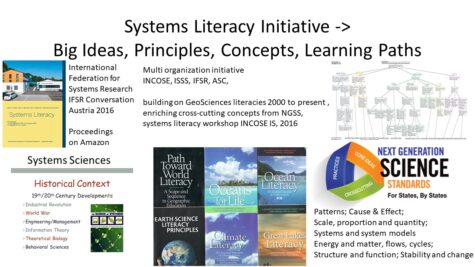The October online meeting of Systems Thinking Ontario presented an opportunity for an update on progress made by the Systems Changes Learning Circle by 2022. A slide deck had been prepared an in-person seminar at the Universitat de Barcelona Graduate Programmes in Business, organized by Ryan C. Armstrong, one week earlier. Our regular monthly meeting, centered in Toronto, allowed a more leisurely pace, and a better affordance for capturing the session for playback.
The agenda provided the background history leading to the Systems Changes Learning Circle, and then focused on the practical approach to “doing” on our pilot engagement.
| A. Rethinking Systems Thinking |
| B. Doing: Hub + 4 spokes |
| C. Thinking: Action learning for facilitators |
| D. Making: Systematic methods via multiparadigm inquiry |
| E. Ongoing learning opportunities |
The meeting followed our usual practice of having participants introduce themselves. About 10 minutes in, the presentation on Parts A and B then started. At 47 minutes, we took a pause for questions and comments. At 1h14m, the presentation on Parts C, D, and E resumed. At 1h32m, the presentation was completed, and more questions and comments were taken to the meeting ending at 1h51m.
This recording of the session is available on Youtube , as well as on the Internet Archive .
| Video | H.264 MP4 |
| October 17 (1h51m20s) |
[20221017_ST-ON_Ing_ReifyingSystemsThinkingTowardsChanges.m4v] (HDPlus 1920×900 643kbps 616MB) [on the Internet Archive] |
A standalone audio was also created during the meeting.… Read more (in a new tab)
The October online meeting of Systems Thinking Ontario presented an opportunity for an update on progress made by the Systems Changes Learning Circle by 2022. A slide deck had been prepared an in-person seminar at the Universitat de Barcelona Graduate Programmes in Business, organized by Ryan C. Armstrong, one week earlier. Our regular monthly meeting, centered in Toronto, allowed a more leisurely pace, and a better affordance for capturing the session for playback.
The agenda provided the background history leading to the Systems Changes Learning Circle, and then focused on the practical approach to “doing” on our pilot engagement.
| A. Rethinking Systems Thinking |
| B. Doing: Hub + 4 spokes |
| C. Thinking: Action learning for facilitators |
| D. Making: Systematic methods via multiparadigm inquiry |
| E. Ongoing learning opportunities |
The meeting followed our usual practice of having participants introduce themselves. About 10 minutes in, the presentation on Parts A and B then started. At 47 minutes, we took a pause for questions and comments. At 1h14m, the presentation on Parts C, D, and E resumed. At 1h32m, the presentation was completed, and more questions and comments were taken to the meeting ending at 1h51m.
This recording of the session is available on Youtube , as well as on the Internet Archive .
| Video | H.264 MP4 |
| October 17 (1h51m20s) |
[20221017_ST-ON_Ing_ReifyingSystemsThinkingTowardsChanges.m4v] (HDPlus 1920×900 643kbps 616MB) [on the Internet Archive] |
A standalone audio was also created during the meeting.… Read more (in a new tab)



